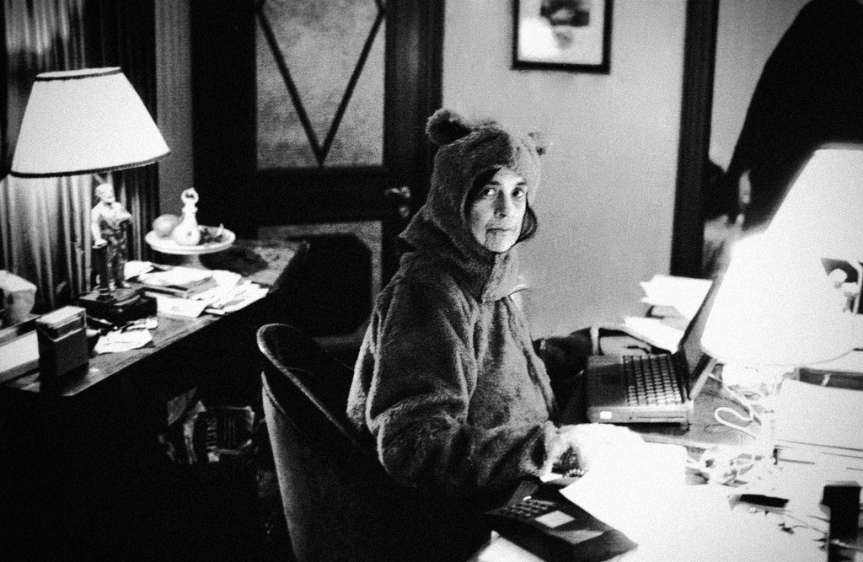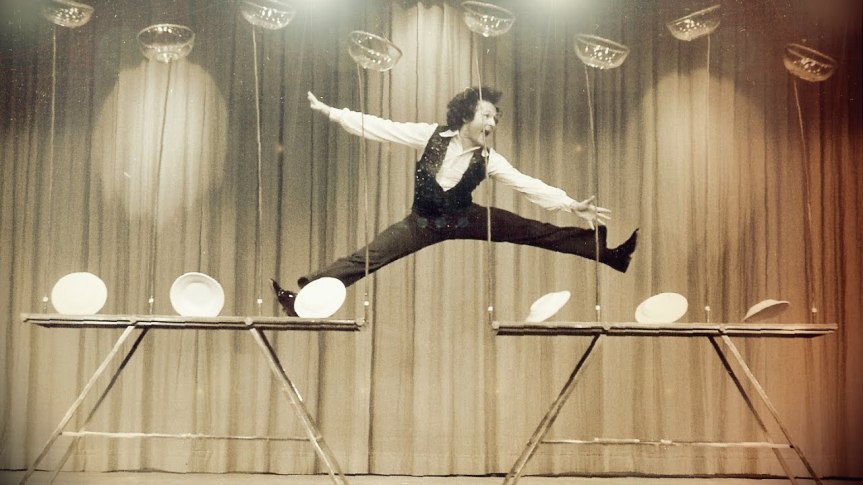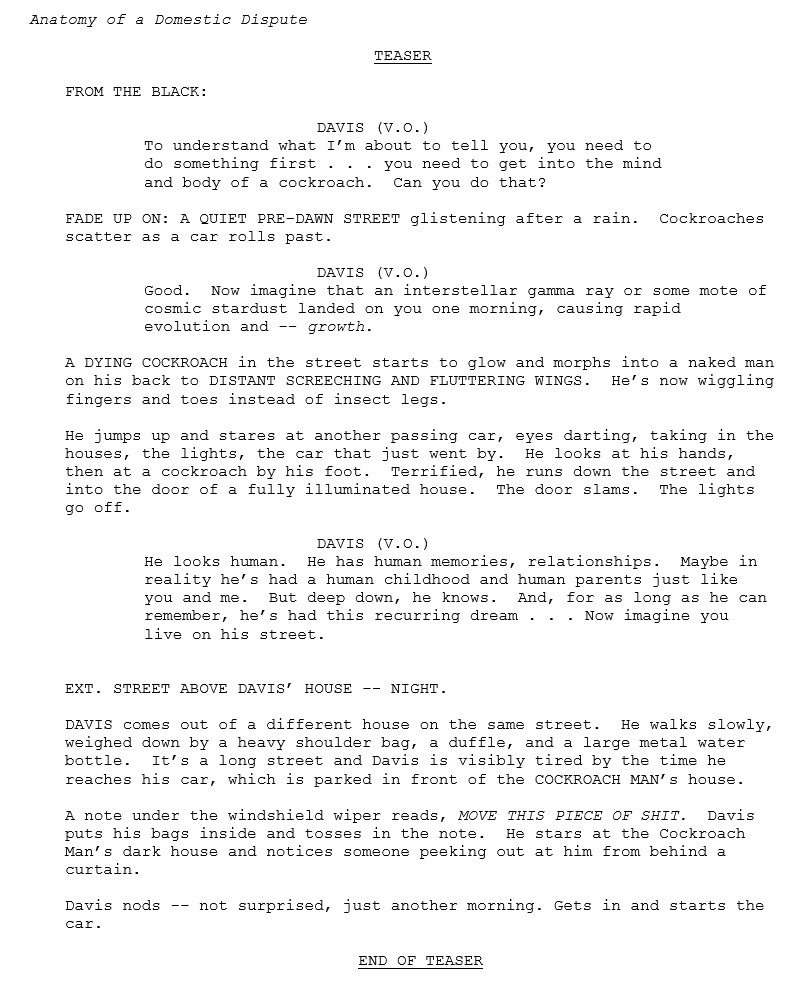
Then my uncle bought the costume shop. And, for a while, things got interesting again. New Years Eve, 1991, he let me borrow a classic notch-lapel tuxedo and some patent leather shoes. The whole package. Socks. A cotton laydown collar shirt. Onyx links. And a midnight solid bow tie.
“You look like James Bond,” he said. Then he turned to my friend, Evert, and said, “You look like James Bond’s hairdresser.”
“Thanks, Uncle Tim,” Evert said.
“Why do you hang out with this guy?”
“I don’t know,” I said. “But, yeah, thanks.”
Evert was wearing the same thing I was. But Uncle Tim never felt right unless he was giving somebody a hard time. He was basically a good guy, funny too. I was sad when they found him three years later.
This was supposed to be a fun night. The Hotel Escondido threw a big party every year. You needed formalwear to get in. And an invitation. So Evert and I already had the problem half solved thanks to my uncle, who now sold costumes but also wedding gowns, tuxedos, and second hand suits.
He put three folded hundreds in my pocket and gave me a hug. “Don’t give any to goofball over there.”
Evert was waiting by the door. “I can hear you,” he said.
“Be careful,” Uncle Tim said and chucked me on the shoulder.
I was 18. The year before, Evert and I snuck into the Hotel Escondido in the best clothes we could find. I was in my old pinstripe Confirmation suit that I had to keep unbuttoned because it had started to tear inside. Evert wore a sweater and khakis. We ate canapés, got drunk on fancy champagne, watched the fireworks from a stone balcony, and made out with girls two years older than us, who said they were getting paid to be there. After midnight, Evert and I escaped through the side entrance one step ahead of security. It was great.
This year, we were going to do it right. We’d studied the floorplan. We knew the exits. We knew what to say to security. And with Uncle Tim’s assistance, I felt we were bound to meet some nice girls this time who weren’t being paid.
When we got in my ancient Rambler, Evert said, “Why is your uncle such a dick?”
“He gave us these suits, didn’t he?”
“He’s a dick.”
“He’s old school. He went to jail a couple years ago. He had a messed-up childhood.”
“Dick.”
It was somewhat true. Uncle Tim could act obnoxious, always seemed a little angry, dressed in all polyester, and smoked too much. But he could pick you up with one hand. He loved dogs. And his laughter could almost knock you over. Nobody talked about why he went to jail.
I parked in the dark corner of a dirt lot seven blocks away from the hotel and set my two steering wheel locks. Then I pulled the old Alpine out of the dash and put it in the trunk under a piece of cardboard and some crumpled newspapers. Downtown San Diego in the late 1990s wasn’t bad. And the Rambler wasn’t good. But such were the cars that usually got jacked—the buckets. And anything Honda. Evert never stopped making fun of me for using two steering wheel locks on a car like mine, to which I always responded, “Get your own fucking car, then,” and to which he never had a comeback.
The street was ghost empty. And we could see the Hotel Escondido’s lights turning the everything yellow down at the end. It had originally been a 15-story office building, built on a hill in 1949 in a time before mirror-glass and rooftop helipads. It had gargoyles. The elevators were marble and brass and smelled like old metal. And there were butt urns set every few feet down the halls. If you were going to crash a big holiday party, that was the place.
The festivities would be in the ballroom on the ground floor, an enormous space with parallel staircases on either side sweeping up to a vast mezzanine and a stone veranda that overlooked the lights of India Street and the bay. What most didn’t know was that there was a dirt trail up the side of the hill to a small, unlockable wrought-iron gate. The gate opened onto a narrow service staircase that led up the side of the building to the veranda.
When I’ve told others about that night, they’ve asked me, “Did you get thrown out?” as if that were the punchline, the most important detail, some kind of moral at the end. I never know what to say. Of course we got thrown out. Was it a stupid plan? Of course it was. Were we stupid kids? My answer to that is all kids are stupid at 18. The trick to having more good memories than bad is to be the right kind of stupid at the right time.
Later, I waited in the Rambler in front of Evert’s house while he changed into some sweats. He brought his tux out in a large paper grocery bag, shoes on top.
“Tell your uncle thanks. But I don’t think I’ll be doing this again.”
I nodded, waved, and pulled into the street. In the rear-view, I saw Evert standing in the drive next to his mother’s gray Pinto, watching me go. We wouldn’t be doing this again because Evert was headed to college in a few months. And I was headed nowhere. Uncle Tim already said I could work for him at the shop. I was considering it. But it wasn’t something I felt like talking about.
When we snuck down from the veranda, we expected a grand ballroom full of people. But it was half-empty and it didn’t look like the management had paid any models to stand around and look glamorous. The DJ was spinning solid ’70s disco and nobody there looked under 40. A few drunk soccer moms were doing something that vaguely resembled the Twist in the middle of the floor, acting more self-conscious than the kids at my high school dances. No waiters with canapés. Only a long buffet table with a cashier at the end.
It took about an hour for security to notice us and show us to the door. We didn’t run. It was too depressing and low energy for that. Last year, they’d worn tuxedos, too, and had little earpieces like in a spy flick. This year it was black windbreakers with SECURITY in yellow block letters across the back.
“Let’s go.” A windbreakered guard with curly blond hair beneath a black and yellow ball cap that read “A-1” put his hand on my shoulder and guided me toward the lobby. Evert trailed, looking down, hands in his pockets.
“I’ve got an invitation,” I said.
“Sure.” The guard opened one of the front double doors for me. “Have a happy new year.”
“You, too,” Evert said, “You have a hell of a year,” as the guard shut the door softly behind us.
Evert lived with his mom and sister about five minutes from Pacific Beach. After I dropped him off, I parked in an alley near Crystal Pier and walked down to the end. The beach bars were full. You could hear the distant shouting and music like little pockets of chaos, little hell caverns, each competing for some sort of reward to see who could be the most crazy and perverse. The Garden of Earthly Delights. Every New Year’s Eve, the whole world became that painting.
The pier smelled like creosote and rotten wood. It went far and high enough over the water that you could dive off the end and swim back. At least, that’s what everybody said. Or you could die. It was a big dare, one of the many opportunities for making a bad decision you encountered as a teen in San Diego. The bad kind of stupid. I thought about jumping. I could give the ruined tuxedo back to Uncle Tim with the $300 and make up some wild story. He’d love it. Instead, I leaned against the railing and looked back at the city glittering electric in every color of the rainbow.
To my left, one of the fishermen you saw on the beach all hours of the day and night took a swig of something in a paper bag and said, “Prom?”
“New Year’s.”
“Wow.” He smiled, adjusting his fishing pole against the rail. “Fuck that.”
The sky was clear. There was a full moon. And you can’t stay at the end of a pier forever, even though there were some nights I’d spend hours there, leaning against the rough wooden railing. If the beach bars sounded like an infernal Hieronymus Bosch pep rally, the ocean at night was a different sort of hell: black ribbon over glittery onyx, the sound of the surf letting you know there’s a lot going on out in that faceless, trackless dark and you’re right on the edge. One step off the pier was all it took to be part of it forever.
Time of night changes the darkness on a street, even if it’s beachfront and lit up like New Year’s Eve. I walked down Ocean Front, avoiding the crowds in front of the bars, made a left on Hornblend, and crossed Mission. Tourists from New Jersey, Connecticut, Vancouver, New Mexico, all drunk, packed ten to a truck, no shirts, speeding pale through the streetlights, hollering, tossing crumpled beer cans at the dark storefronts.
Growing up in San Diego, I saw them every year, every holiday, every summer night I spent at the beach. No big thing. Half of them would be arrested by dawn. A fourth would go home and make up tales of the vacation they’d had. Maybe a sixth would believe their own lies and want to move to California someday. But they’d never be able to afford it. Or they’d get as far as Bakersfield and learn the true meaning of heartache.
I told myself if the party at the hotel had only been better, I’d feel differently about everything. I told myself then I wouldn’t feel so depressed. But none of that was real enough to be true. It was just a story I was telling. Truth was, I didn’t feel much of anything. No anger. No pain. No regret. No sense of missing out or that I had to search for something better. Nothing but a faint melancholy, a vague tiredness. High school, my life, was about waiting, everything calculated in terms of how long things were going to take, when I could expect them to end, what I’d have to put up with until they did.
And I told myself Evert had it better. But what did I know? “I don’t think I’ll be doing this again,” he’d said. “Why is your uncle such a dick?” he’d said. I could have told him some obscure Tibetan Buddhism fact from world history, “Yes, the answer is to just apply yak oil to the icon of Yidam Kurukulla and do the great dance of the Knowledge-Causing Mother-Buddha,” and Evert would have given me the exact same look. The I’m leaving for college look. The too bad you aren’t but that’s how it goes look.
Right on Bayard and down past Grand. Left on Thomas where the old cinderblock apartment complexes rust and crumble to eternity. At night, they look like industrial back lots for meat packing plants or ball joint factories. Weird and empty. Nothing you’d want to spend time in. Orange-white safety lights always buzzing. Concrete stairwells that smell like piss. Some tatted-up, naked guy in a window, holding a bottle of wine.
Where was I walking at the end of 1991 in Uncle Tim’s notch-lapel tuxedo? I thought the Rambler might have already been towed, which made everything feel even more tiring, more futile. Home was in North Park, 20 minutes east on the 805, with a mother and father whose idea of a good New Year’s Eve was not having to suffer fools all night and start the new year with a headache. They were smarter than me. I told myself next year I’d go to bed early.
One of the apartments, three flights up, was open, light streaming down into an empty courtyard parking lot, stereo thumping. A woman with long wavy green hair leaned over the metal railing and waved at me like otherwise I wouldn’t notice.
“Come up here,” she said. Flannel shirt and jeans. Very drunk.
I looked at her.
“Steve. Come up and dance.”
The stereo inside was loud. I had to shout. “I think you got the wrong guy!”
“Steve! Get up here!”
“I’m not Steve!”
“Don’t worry about it!” She waved me up in wide, exaggerated arcs. I thought she might lose her balance and go headfirst over the railing.
Inside, ten extremely drunk people were trying to dance in the small shag-carpeted living room. A few cardboard boxes of Bud Light had been savagely torn open and unopened cans had rolled under the plastic coffee table. On the couch, a very large man snored with his shirt unbuttoned, wet spot on his crotch, unlit cigarette between his fingers. I looked at his hairy belly, at the green-haired woman who said her name was Ada.
“I’m Steve,” I said. A joke. But she was busy telling me how the man on the couch had stolen the beer out the back of a liquor store.
“He’s a genius,” she said. “He’s Polfrey.”
“That’s his last name?”
She frowned up at me. “What?”
I smiled and shrugged.
Ada stepped back and took me in. “What’re you doing in that mod getup?”
“Not a lot,” I said. And that she understood.
We danced. We danced slow when everyone else was dancing fast and falling into each other. Some bleached surfer went face-down into the plastic coffee table, rolled on his back, and laughed. A girl in a burgundy pencil skirt and cream blouse, looking like she’d just got off work at an insurance office and didn’t approve of any of this, sat on Polfrey’s legs, took the cigarette from between his fingers, and lit it. Someone sprayed beer on the stereo, on the window, on the splotchy ceiling light. Someone said happy fucking New Year.
I thought Ada might be in her 30s, but at that time I wasn’t good at judging anyone’s age beyond my own. She laid her head on my chest. “You sure are dreamy, Steve. I could take you home to mama.”
We went out in front of the apartment, kissed for a while, and leaned against the railing. “But I don’t live with my mama. You want me to take you home? My girlfriend wouldn’t like that one bit. You get high? Do drugs?”
I said I didn’t and Ada patted me on the shoulder. “That’s good, sweetie. You keep that dreamy smile.”
“I should go,” I said. “They might tow my car.”
She gave me a fierce hug and kissed me on the cheek. “I’m gonna get high.”
At the edge of the parking lot, I looked back. Ada was still standing at the railing, silhouetted in the doorway light, waving in slow motion, like when you watch someone’s ship pull away from the pier, not really expecting to see them but hoping you might catch one last glimpse.
Walking back to the Rambler, I decided that when I returned the tuxedo, I’d tell Uncle Tim I met a nice girl and we danced all night. He’d say something like, after you ditched that moron friend of yours, right? And I’d say yeah, that’s right. Exactly.










